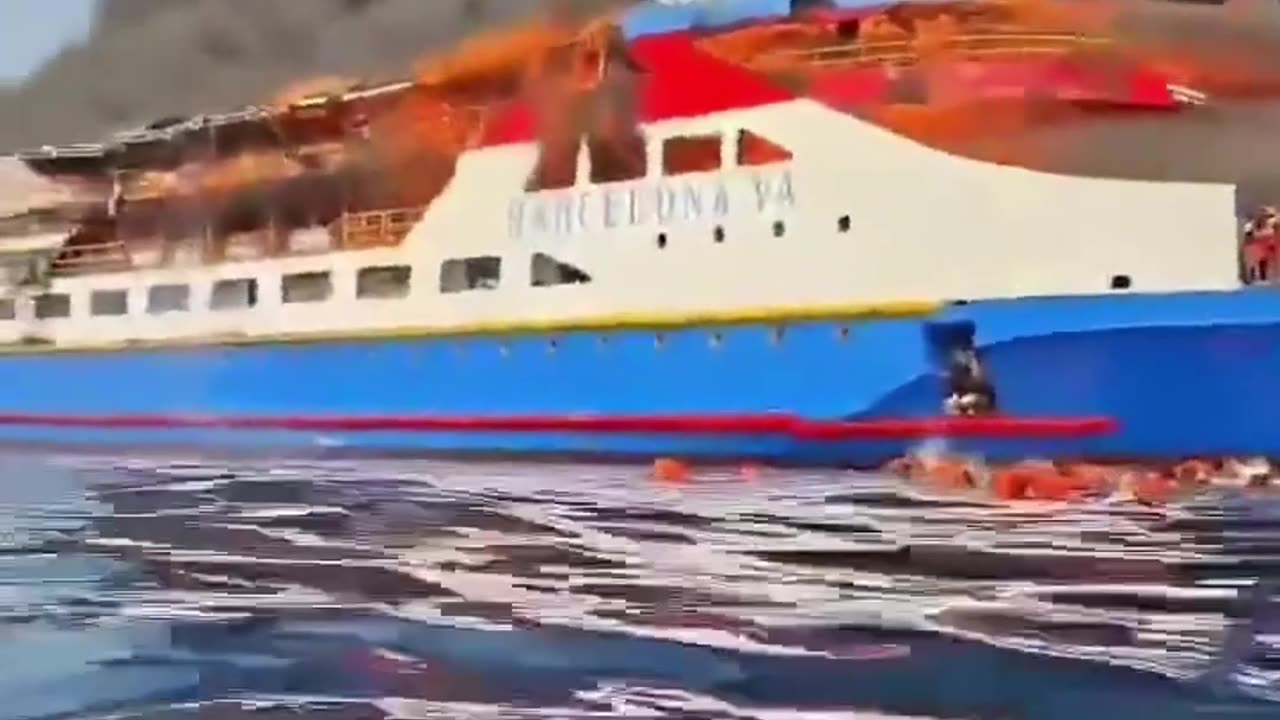Premium Only Content

Disaster on Indonesian Ferry: Hundreds Rescued
On Sunday, July 20, 2025, a tragic maritime accident shocked Indonesia. The ferry KM Barcelona 5, on its regular route between Melonguane and Manado in the northern Sulawesi region, caught fire near Talise Island. What began as a routine journey ended in chaos and panic: intense flames, black smoke covering the sky, and hundreds of passengers throwing themselves into the sea in a desperate attempt to survive.
Explosion, Fire, and a Desperate Escape
The fire started on the ferry’s upper deck and spread quickly. Entire families were aboard, including children and elderly passengers. With no effective containment system, the fire extended to other parts of the ship. Many passengers were forced to jump into the sea from different levels of the ferry. Some barely managed to put on life jackets before plunging into the water.
Survivors described scenes of complete confusion: screams, thick smoke, passengers searching for relatives amid the chaos, and others pushed by desperation to escape the flames. The sea became their only way out.
Massive Rescue: Over 570 People Saved
Although initial reports indicated the ferry carried about 280 people, the actual number exceeded 570 passengers. This once again revealed serious discrepancies between official manifests and the real number of passengers traveling on these vessels. Despite adverse conditions, rescue efforts managed to save the majority of those aboard.
However, not everyone was so fortunate. At least three people lost their lives, including a pregnant woman. Two others remained missing at the time of the report. Several civilian boats, along with maritime rescue units and coast guard vessels, participated in the evacuation efforts. Among the rescued was a two-month-old baby who was taken to a hospital after inhaling seawater.
Causes and Irregularities of the Incident
The official cause of the fire has not yet been determined. Preliminary investigations suggest an electrical failure or an overload in the ferry’s generator area. What is clear is that the incident was not simply an isolated accident, but a reflection of a bigger problem: the lack of strict controls and regulations in the country’s maritime transport.
Overcrowding is a common practice on many Indonesian ferries. Transport companies allow boarding without properly registering all passengers, which not only poses a safety risk but also complicates rescue operations. Lack of technical maintenance, insufficient staff training, and absence of emergency drills are other factors that worsen these tragedies.
An Island Nation with Structural Challenges
Indonesia is a country made up of more than 17,000 islands. Maritime transport is essential to the daily lives of millions, especially in remote regions where access by land or air is limited. However, this dependence on the sea has not translated into safe and reliable infrastructure.
Passenger vessels in Indonesia, often low-budget and poorly maintained, operate under risky conditions. Regulations exist, but enforcement is weak and oversight mechanisms ineffective. This fire, like other recent tragedies in Indonesian waters, exposes the consequences of decades of neglect and underinvestment in the sector.
Human and Emotional Impact
Beyond the numbers, the most devastating aspect of this tragedy is the human stories it leaves behind. Families torn apart, missing persons, children rescued from the water crying, elderly who couldn’t jump in time. The sea, which represents life and livelihood for so many Indonesians, turned into a scene of horror and death within minutes.
Images of the ferry engulfed in flames, survivors floating for hours until picked up by fishing boats, and bodies recovered by rescue teams deeply affected the population. For many, this event reopens recent wounds from similar tragedies that have yet to find justice or resolution.
A Tragedy That Must Not Repeat
The KM Barcelona 5 fire left an indelible mark on Indonesia’s collective memory. Not only because of the scale of the disaster or the lives lost, but because it starkly reflected the failures of a system that does not protect those who need it most. Authorities have promised to investigate, review regulations, and punish those responsible. But experience shows that such promises, without real action, fade with time.
This must not be just another case. It should be a turning point to transform maritime transport in Indonesia. A country with so many islands cannot continue sailing in informality or allow thousands of citizens to put their lives at risk every time they board a ferry.
The waters of Southeast Asia have witnessed this tragedy. Now, the challenge is to prevent it from happening again.
-
 LIVE
LIVE
Jeff Ahern
1 hour agoThe Sunday Show with Jeff Ahern
294 watching -
 27:41
27:41
DeVory Darkins
1 day agoMarjorie Taylor Greene STUNNED after Trump pulls her endorsement
22.2K229 -
 32:41
32:41
Tactical Advisor
2 hours agoNew Red Glock? | Vault Room Live Stream 045
36.4K5 -
 LIVE
LIVE
Major League Fishing
3 days agoLIVE! - Fishing Clash Team Series: Summit Cup - Day 1
844 watching -
 4:38
4:38
Talk Nerdy Sports - The Ultimate Sports Betting Podcast
4 hours agoNFL SUNDAY — Top 10 Locks You NEED to See (Nov 17)
25.1K -
 18:03
18:03
Nikko Ortiz
3 hours agoNikko Ortiz Night Routine...
13.8K5 -
 21:37
21:37
Forrest Galante
16 hours ago6 Deadly Sea Monsters That Actually Exist
117K8 -
 LIVE
LIVE
JdaDelete
3 hours ago $1.37 earnedElden Ring | First Playthrough Episode 10
146 watching -
 8:10
8:10
MattMorseTV
1 day ago $65.93 earnedDemocrats caught COLLUDING with Epstein.
84.6K132 -
 2:05:50
2:05:50
Pepkilla
4 hours agoBreakfast First ~ Camo Grind Call Of Duty Black Ops 7
15K1